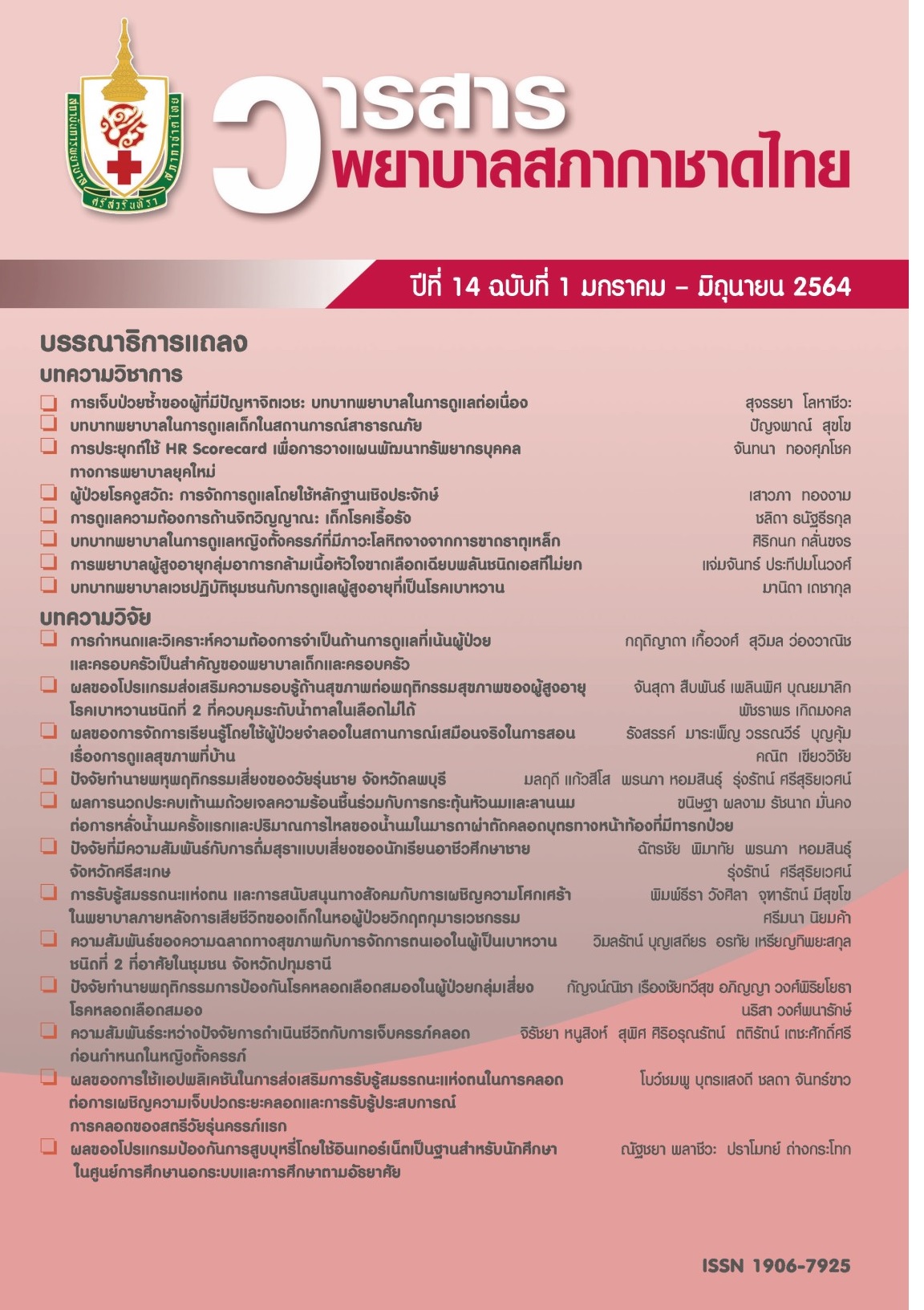Factors Related to Coping with Grief Among Nurses After Suffering a Child’s Death in the Pediatric Intensive Care Unit
Keywords:
coping with grief, grief among nurses, pediatric intensive care unitAbstract
The aim of this research was to identify a way of achieving self-efficacy and social support related to coping with grief among nurses after experiencing a child’s death in a pediatric intensive care unit. The samples were 92 registered nurses (RNs) who work in pediatric intensive care unit at tertiary hospitals,. Questionnaires were used to gather general information regarding the perception of self-efficacy in coping, social support to help deal with grief and techniques for coping with grief after a child’s death. Data were analyzed using descriptive statistics and the Pearson product correlation coefficient.
The results found that 63% of nurses had a low level of coping with grief. Perceived self-efficacy had a statistically significant positive relationship at a low level (r = 0.244, P < .05). Social support had a statistically significant positive relationship at moderate level (r = 0.348, P < .01).
The results of this study can provide important information for supporting nurses.
References
2. Ibiebele I, Algert CS, Bowen JR, Roberts CL. Pediatric admissions that include intensive care: a population-based study. BMC Health Serv Res 2018;18(1):264-72.
3. Bryant CR. From the top down: assisting critical care nurses in coping with job stresses [Thesis]. Lynchburg: Liberty University; 2017.
4. Stayer D, Lockhart JS. Living with dying in the pediatric intensive care unit: a nursing perspective. Am J Crit Care 2016;25(4):350-6.
5. Roseline A, Tasner C, Aichetou E. Coping strategies used by nurses in dealing with patient death and dying [Thesis]. Jyväskylän, Finland: JAMK University of Applied Sciences; 2016.
6. Zheng R, Lee SF, Bloomer MJ. How nurses cope with patient death: A systematic review and qualitative meta-synthesis. J Clin Nurs 2018;27(1-2):e39-e49.
7. Rodríguez-Rey R, Palacios A, Alonso-Tapia J, Pérez E, Álvarez E, Coca A, et al. Burnout and posttraumatic stress in pediatric critical care personnel: Prediction from resilience and coping styles. Aust Crit Care 2019;32(1):46-53.
8. Crowe S. Disenfranchised grief in the PICU: crying for attention. Pediatr Crit Care Med. 2017;18(8):e367-e9.
9. Jalowiec A, Murphy SP, Powers MJ. Psychometric assessment of the Jalowiec Coping Scale. Nurs Res 1989;33(3):157-61.
10. Lazarus R, Folkman S. Stress, appraisal and coping. New York: Springer Publishing; 1984.
11. Elkazaz RH, Berma AE. Stress and self efficacy among nurses in neonatal intensive care units. International Journal of Research-Granthaalayah 2017;5(2):237-51.
12. Wahlberg L, Nirenberg A, Capezuti E. Distress and coping self-efficacy in inpatient oncology nurses. Oncol Nurs Forum 2016;43(6):738-46.
13. Vaezfar SS, Azadi MM, Akbari BA, Rahimi M. The role of coping styles and self-efficacy in nurses job stress in hospital. IJPN 2014;2(2):22-32.
14. Jacobson DE. Types and timing of social support. J Health Soc Behav 1986;27(3):250-64.
15. Lobb EA, Oldham L, Vojkovic S, Kristjanson LJ, Smith J, Brown JM, et al. Frontline grief: The workplace support needs of community palliative care nurses after the death of a patient. JHPN 2010;12(4):225-33.
16. Krejcie RV, Morgan DW. Determining sample size for research activities. Educ Psycholo Measu 1970;30(3):607-10.
17. Bunjai S. Research methodology in nursing. Bangkok: U&I Intermedia; 2011. (in Thai)
18. Sawasdipanich N, Tiansawad S. Translation of tools for cross-cultural research: techniques and issues to be consider. Journal of Nursing 2012; 26(1):19-28. (in Thai)
19. Ratta N. Principles of creating psychological and education tests. Bangkok: Charoenwitayakanpim; 1990. (in Thai)
20. Meller N, Parker D, Hatcher D, Sheehan A. Grief experiences of nurses after the death of an adult patient in an acute hospital setting: An integrative review of literature. Collegian 2019;26(2):302-10.
21. Plante J, Cyr C. Health care professionals’ grief after the death of a child. Pediatr Child Health 2011;16(4):213-6.
22. Forster E, Hafiz A. Pediatric death and dying: exploring coping strategies of health professionals and perceptions of support provision. Int J Palliat Nurs 2015;21(6):294-301.
23. Strote J, Schrorder E, Lemos J, Paganelli R, Solberg J, Hutson HR. Academic emergency physicians’ experiences with patient death. Acad Emerg Med 2011;18(3):255-60.
24. Shimoinada K, O’Conner M, Lee S, Kissane D. Losses experienced by Japanese nurses and the way they grieve. Journal Hosp Palliat Nurs 2014;16(4):224-30.
25. Mojoyinola JK. Social support and recovery from bereavement: A study among bereaved persons in Oyo and Oke-Ogun Areas of Oyo State, Nigeria. An International Multi-Disciplinary Journal 2010;4(4):223-35.
Downloads
Published
Issue
Section
License
เนื้อหาบทความหรือข้อคิดเห็นต่างๆ ในวารสารพยาบาลสภากาชาดไทยนี้ เป็นความคิดเห็นของผู้เขียนบทความ ไม่ใช่ความเห็นของกองบรรณาธิการ หรือสถาบันการพยาบาลศรีสวรินทิรา สภากาชาดไทย






